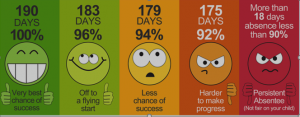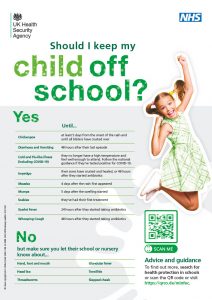Attendance & Punctuality
Attendance & Punctuality
The school day begins at 9:00am and the school gates are opened at 8:45am. Children are recorded as late if they are not in classrooms ready for registration by 9:05am. All lateness is recorded and monitored, so it is important that your child arrives at school on time.
Regular attendance at school is important for your child’s education; however there may be times when your child is too unwell to attend school. To report your child as absent, please call the office on 0208 985 5382 or visit the office in person. If your child is absent for more than one day, please remember to phone the school each morning.
Requesting leave during term time
Leave during term time is only considered in exceptional circumstances. If you do need to remove your child during term-time, it will be necessary to complete a request form which you can pick up from the office.
Attendance
Good attendance at school is not just valuable, it’s essential. Going to school is directly linked to improved learning outcomes which should in turn lead to further opportunities and better job prospects. As well as this, going to school helps to develop:
- Friendships
- Social skills
- Team values
- Good mental health
- Life skills
- Cultural awareness
- Career pathways
Good attendance should begin as soon as children start school, whether this is in pre school or Nursery or in Reception classes. Good habits and high expectations start here!
Absence from school
We record details of pupils’ attendance and absence at school. We do this at the beginning of morning and afternoon sessions meaning that each day your child receives two half day marks.
If your child is going to be absent from school, (e.g. for an unavoidable appointment) then you should let the school know as soon as possible. If your child has been absent due to an unexpected event such as bereavement or illness then you must also let the school know on the first day of absence in line with our attendance policy.
We will then record the absence. If you fail to tell the school as to why your child has not been present then the school may record that period of absence as being unauthorised.
Attendance in figures
We will advise parents of a child’s attendance levels at least once a year. This will usually include a percentage attendance figure.
Achieving 90 per cent in an exam or test is a fantastic result but if your child is at school for only 90 per cent of the school year then they will have missed 19 days – almost four whole weeks of school. For primary-age children, this can mean almost 120 guided learning hours. This is a big gap for any child to make up.
The expected level of attendance for Hackney school children is at least 95%. Our school target for attendance is 96.5%.
Because attendance is so important, we check attendance each month and will let you know by text message as soon as your child’s absence falls below 95%.
Your legal responsibilities as a parent
By law, all children of school age must receive a suitable full-time education. For most parents, this means registering your child at a school or you may choose to make other arrangements to provide a suitable, full-time education.
Once your child is registered at a school, you are legally responsible for making sure they go regularly.
What YOU can do to make sure your child is successful in school, all day, every day
You can help prevent your child missing school by:
- having a routine from an early age and sticking it to it
- making sure your child understands the importance of good attendance and punctuality
- making sure they understand the possible implications for themselves and you as a parent if they don’t go to school
- taking an interest in their education – ask about school work and encourage them to get involved in school activities
- discussing any problems they may have at school and letting their teacher or principal know about anything that is causing concern
- not letting them take time off school for minor ailments or holidays during term time
To avoid disrupting your child’s education, you should arrange (as far as possible), appointments and outings:
- after school hours
- at weekends
- during school holidays
Term time holidays
Term time holidays have been increasing over the last number of years. Parents should make every effort to make sure that their child does not miss school due to holiday plans. Schools are not obliged to agree to you taking your child on holiday during term time. They are entitled to record such holidays as being an unauthorised absence.
The beginning and end of the day
Being punctual is as important as good attendance
Pupils need to arrive on time from 8:45-8:55am and unless they attend clubs, be collected promptly at 3:30 pm. Any children arriving after 8:55am, or picked up after 3:30pm is late.
Year 5 and 6 pupils may make their own way home with parental consent and agreement from the class teacher.
Illness
If you are not sure how long your child should be off school, please click on the image below, for a clear guide. For more information on an illness or condition and the latest up-to-date guidance please visit nhs.co.uk.


